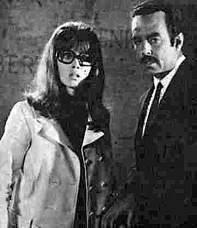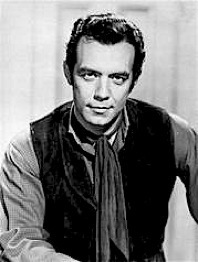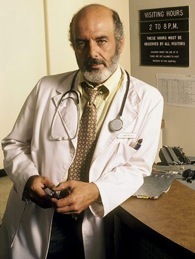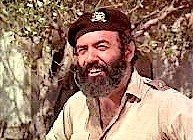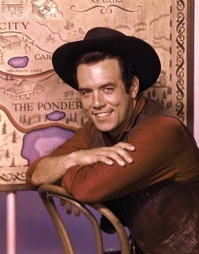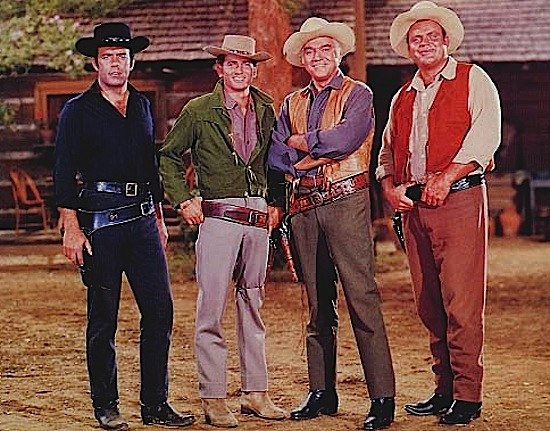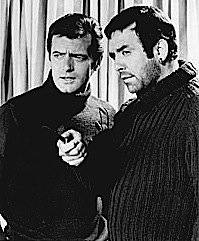Pernell Roberts
d. January 24, 2010
Pernell Roberts, headstrong actor who walked away from the hit series Bonanza at the peak of its popularity, died of pancreatic cancer Jan. 24
at his home in Malibu. He was 81.
On the long-running NBC series, Roberts was Adam Cartwright, eldest son of rancher Ben Cartwright (played by Lorne Greene), who owned the impossibly vast Ponderosa spread near Virginia City, Nev., in the 1860s. Dan Blocker played second son Hoss, the gentle giant, and Michael Landon portrayed the youngest of the three, hotheaded Little Joe. Adam was typed as the intellectual and even-tempered brother.
Roberts chafed at the character and the scripts almost from the show’s beginning in September 1959. “Isn’t it just a bit silly for three adult males to get father’s permission for everything they do?” he told The Washington Post in 1963. “I haven’t grown at all since the series began four years ago. I have an impotent role. Everywhere I turn, there’s the father image.”
Georgia-born Roberts attended Georgia Tech and the University of Maryland, flunking out three times as he discovered a love for performing. He sang in college, played tuba in the U.S. Marine Corps band at Quantico, Va., and after his discharge appeared in 18 productions during two years at the newly formed Arena Stage in Washington, D.C. Moving on to New York, he played Mephistopheles in “Dr. Faustus,” Petruchio in a Broadway production of “The Taming of the Shrew,” and won a Drama Desk Award for his performance in the title role of an off-Broadway “Macbeth.”
Lured to Hollywood in 1957, he appeared in “Desire Under the Elms” with Sophia Loren and Anthony Perkins, and then in two westerns: “The Sheepman,” with Glenn Ford and Shirley MacLaine, and “Ride Lonesome,” a Randolph Scott starrer directed by Budd Boetticher. Those parts and some TV guest shots (on Trackdown, Sugarfoot, Have Gun Will Travel, Zane Grey Theatre, One Step Beyond, 77 Sunset Strip and others) brought him to the attention of Bonanza producer David Dortort.
Scripts that featured him in the lead or included his singing talent did little to placate Roberts, who finally made no secret of his intention to leave Bonanza as soon as his six-year contract ended. “They told me the four characters would be carefully defined and the scripts carefully prepared,” he griped to the Associated Press shortly before his departure. “None of it ever happened.”
Bonanza started slowly but became the highest-rated show on the air soon after NBC moved it to the 9 p.m. Sunday timeslot, where it dominated 1960s television and knocked off competitors as formidable as Jack Benny, Judy Garland and Garry Moore. Dortort and his co-stars tried to make Roberts see that a few more years on the show would leave him wealthy enough to finance any serious acting job he could dream of. “Don’t be a damn fool,” Greene reportedly told him, “take their money and buy your own studio.” Roberts would have none of it, and when the series returned for its seventh season in September 1965, Adam was said to be “traveling” and was rarely mentioned again.
Bonanza continued for almost eight years without Roberts, still routinely drawing the largest Sunday audience until 1972, when NBC made an ill-considered change in its schedule, putting the show on early Tuesdays against Maude and Hawaii Five-0. That move, coupled with the shocking death after routine surgery of 43-year-old Dan Blocker just before filming started on the new season, doomed the show. Bonanza was unceremoniously canceled in the middle of its 14th season. Ironically, Roberts was the last survivor of the original cast. Greene died in 1987 and Landon died suddenly in 1991 at the age of 54, also from pancreatic cancer.
Roberts planned to join a Minneapolis repertory company immediately after leaving Bonanza, but when that deal fell through he returned to Hollywood to pick up TV work. Comments that guest shots on The Big Valley and Gunsmoke were hardly the acting challenges he claimed to be seeking drew Roberts’ pithy reply, “I have to eat.” In 1967, he appeared with Robert Goulet in a TV production of “Carousel” and co-starred in “Dear Friends,” a Reginald Rose play seen on CBS Playhouse. But most of his TV work was typical guest-star fare.
He had the villain role in four episodes of Mission: Impossible, played an Irish revolutionary in The Wild Wild West, and appeared in a peculiar episode of The Girl From U.N.C.L.E. as a sympathetic gangster menaced by a mild-mannered hitman played by Wally Cox.
He appeared more frequently in the 1970s on episodes of The Virginian, The Bold Ones, Night Gallery, The Name of the Game, Mannix, Hawaii Five-0, Alias Smith and Jones, Marcus Welby M.D., Banacek, Ironside, The Six Million Dollar Man, The Odd Couple, Police Story, Ellery Queen, The Rockford Files, Police Woman, The Paper Chase and others.
In 1970, Roberts starred in the TV-movie pilot “San Francisco International,” in the role filled by Lloyd Bridges in the short-lived series that ran as part of NBC’s Four in One title. He also appeared in such TV-movies and mini-series as “Assignment: Munich,” “The Adventures of Nick Carter,” “The Deadly Tower,” “Captains and the Kings” and “Centennial.”
When not on television, he starred in touring companies of such musical warhorses as “Camelot,” “The King and I” and “The Music Man.”
Roberts surprised his fans and critics in 1979 by taking on another TV series as the star of Trapper John, M.D. This fairly standard medical drama was almost as durable as Bonanza, running for seven seasons on CBS. In another bit of irony, Roberts portrayed an older and wiser version of the character Wayne Rogers played in the first three seasons of M*A*S*H. Rogers left that popular, long-running series — it was still on the air during Trapper John’s first four seasons — complaining that his Trapper role was going nowhere and was constantly overshadowed by Alan Alda’s Hawkeye.
Roberts soon took on even more unlikely roles, as CBS team captain in several editions of “Battle of the Network Stars” and, after Trapper John ended its run, the host of FBI: The Untold Stories, one of the first attempts to replace glossy filmed drama series with cheap “reality” programming. He retired after playing a guest role in a 1997 episode of Diagnosis: Murder.
Roberts admitted he took Trapper John, M.D. for financial security rather than artistic fulfillment, but claimed he never regretted leaving Bonanza. “I had six seasons of playing the eldest son on that show,” he said. “Six seasons of feeling like a damned idiot, going around like a middle-aged teenager saying ‘Yes, Pa, No, Pa’ on cue. It was downright disgusting, such dialogue for a grown man. I felt I wasn’t being taken seriously as an actor, and that’s like death to one’s talent. Stuck as Adam Cartwright, I was only able to use about one-tenth of my ability.”


